BBC West Investigations
BBC West Investigations
WARNING: This article contains details of a sexual nature and child sex abuse. If you have been affected by anything in this story, help can be found at the BBC Action line.
As darkness falls, street sex workers are helping police and a charity to protect a city’s most at-risk children.
Often the eyes and ears after dark, the women have been providing vital information on child exploitation to the Night Light initiative in Bristol and helping to bring child sex offenders to justice.
“If you think there’s a chance you’re leaving a child in that position, you’ve got to stay. You’ve got to find out.”
Anna, whose real identity the BBC is protecting, is in her 50s and worked on the streets of Bristol over a 30 year period. She says she is now “retired”, but has been key to the success of a unique project helping to put dangerous criminals in prison.
On one occasion a man, who was paying her for sex, asked her to engage in role-play, where she had to pretend to be a primary school age girl.
“It was really unpleasant. Sickening to be honest,” she said.
“I had to carry on for three months, but I couldn’t walk away until I knew what was happening.”
After reporting her concerns to the police, it turned out the man was abusing his eight-year-old daughter.
Anna testified against him in court and he has now been sent to prison.
In another case, a man showed her child abuse photos on his phone so horrific she could not watch but reported him to the authorities and he is now awaiting trial.
“You can’t not do something about that,” she said.
“I see that kid’s face every time I shut my eyes.”
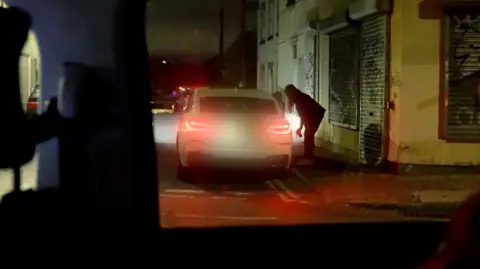
The sex workers are not only helping to catch child abusers, but also helping to identify children at risk of exploitation and get underage girls off the streets.
“The streets are scary. They are dark, they are lonely,” Megan, not her real name, said.
“For underage women, like just so young, children, to be going through whatever they are going through, wherever they are, I can’t bear to imagine.”
Megan is one of those working with Avon and Somerset Police and children’s charity Barnardo’s Night Light team – providing them with vital intelligence about the children she sees after dark.
“My hectic day to day lifestyle [as a sex worker] is troubling, exhausting, and very miserable, to just have that little bit of positivity brought through something I have achieved and done personally, is great. It makes me feel proud,” she said.
Night Light started in 2020 during the Covid lockdowns.
The streets had become quieter, exposing the children who were at risk of being exploited, hanging around in the part of Bristol where sex is bought and sold.
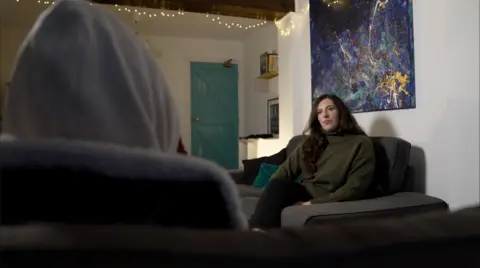
Paige, not her real name, was vulnerable and just 15-years-old when she was spotted with her sister. She told the BBC that at the time, she wasn’t aware of the danger she could be in.
“We were out because we didn’t want to be at home, as we thought being out at night was safer than home,” Paige said.
Forced onto the street she was approached by men being “nice”, offering her food, drinks or lifts and getting into their cars.
“I didn’t think I was at risk, but looking back now I see things a lot differently,” she said.
Paige and her sister initially ran away from the Night Light team on at least two occasions.
But identified as being at risk of sexual exploitation, the team eventually caught up with her and explained the danger she was in. Paige has now been placed in a foster home.
Now 19-years-old, Yas – also not her real name – has also been helped by the team.
“They [men] would ask me if I wanted go to their place and if I want any drink or like they’d offer me balloons [nitrous oxide],” she said.
“Back then I couldn’t see why they were asking that. I thought they just wanted to have fun, in like the innocent way, but now I’ve realised they were probably asking me to go back so that I would have sex with them.”
Now supported by Night Light, Yas said thinking about the situation she was in makes her feel “creeped out” and scared for other young people.
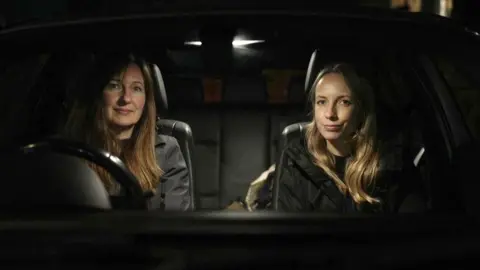
The potential and benefits of using street sex workers to help stop child exploitation was first realised by Jo Ritchie, a social worker employed by Barnardo’s.
She now works closely with Rose Brown, a sex work liaison officer from Avon and Somerset Police, as well as Bristol City Council.
Jo recalled one of the first women she spoke to, saying her knowledge was so good it was like she was part of the police investigation.
“She knew everything. But what was really sad, was at the end, she said ‘but what can I do? I’m just a sex worker.’
“And that really struck me. I really felt, actually, we could really do with your help.”
In 2024 the Night Light team had 124 conversations with street sex workers – who have made 65 reports about dangerous men and highlighted around 20 young people at risk of exploitation.
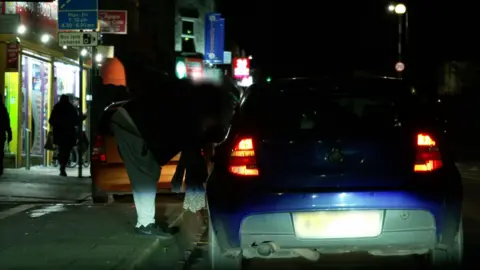
The trust that has built up between the sex workers and the Night Light team has been key to its success.
As well as talking to them about children they have seen on the streets and dangerous offenders, they also offer the women support, food, clothing and a supportive ear.
Rose said that since the project started five years ago, they have seen huge progress.
“We’re getting a massive increase in the women sharing about their own experiences of being sexually assaulted, as well as worries about children,” she said.
“It isn’t rocket science. It is just investing that time in building those relationships.”
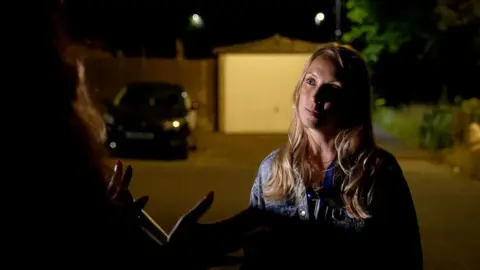
Because many of the women have been sexually assaulted themselves, they are keen to prevent young people from going through similar experiences, Jo said.
“Time and time again, we hear them say, ‘I wish this had been running when I was a kid, because perhaps I wouldn’t be out here now’,” she added.
“I think they’re probably the most passionate advocates… they really don’t want to see children on the streets.”
Megan, 34, doesn’t want to be working on Bristol’s streets for long, but while she is, she said she is proud to have helped safeguard other girls.
“The underage thing is something I really feel strongly about,” she said.
“There’s a bad stigma about sex workers, drugs… but we’re not bad people.”
‘Highest risk children’
Night Light is proving so successful in Bristol, that other parts of the country are now looking to roll the project out.
And Rose and Jo are both very clear, Night Light would not exist without the women, and hope it helps to challenge the narrative around street sex workers.
“They’re incredible,” Jo said.
“We are totally dependent on them. We’ve identified children at risk, who are out on the streets, who we weren’t aware of, because of them.
“And that’s really one of the key things about Night Light, the children they are pointing us towards are probably some of the highest risk children, but yet they are often really hidden.”

